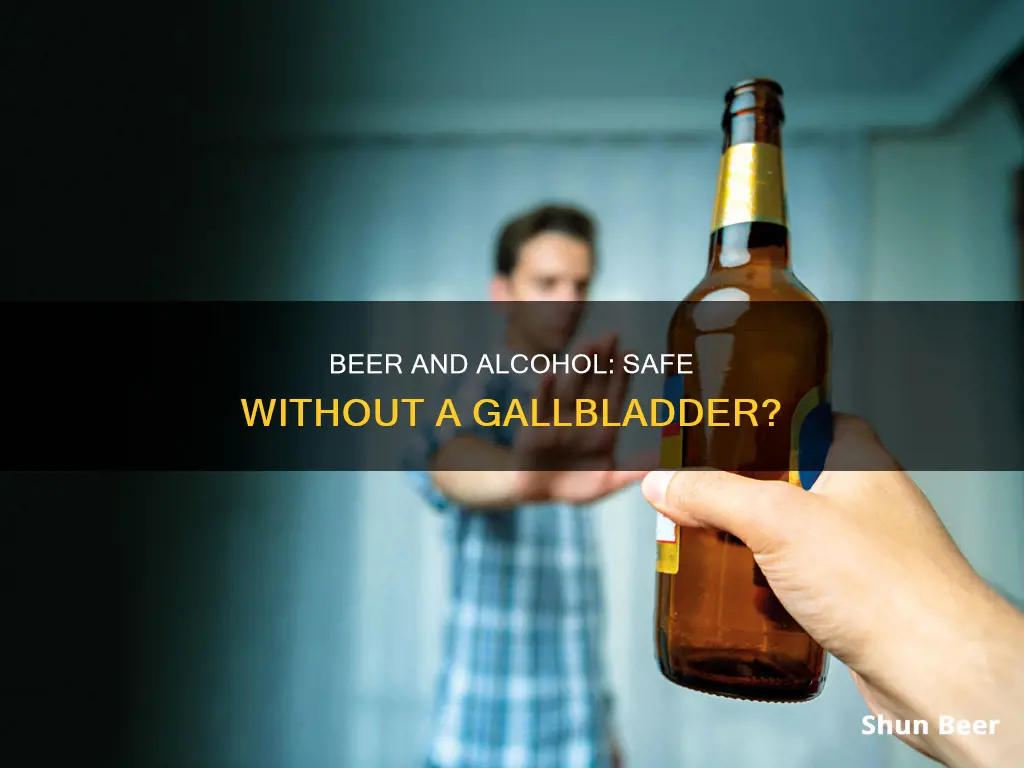
The gallbladder is a small, pear-shaped organ located beneath the liver. It is part of the biliary system and plays a crucial role in digestion by storing and releasing bile, a substance that helps break down fats. While moderate alcohol consumption may not directly cause gallbladder problems, heavy drinking can negatively impact the gallbladder and increase the risk of issues such as gallstones and inflammation. So, can someone without a gallbladder still drink beer and alcohol?
| Characteristics | Values |
|---|---|
| Can someone without a gallbladder drink alcohol? | Yes, but it is recommended to consult a doctor first. |
| What is the recommended amount of alcohol consumption? | Moderate alcohol consumption is generally defined as up to one drink per day for women and up to two drinks per day for men. |
| What are the risks of drinking alcohol after gallbladder removal? | Digestive discomfort, increased sensitivity to alcohol, risk of liver damage, weight management issues, medication interactions, and dehydration. |
| What are the effects of alcohol on the gallbladder? | Alcohol can affect gallbladder emptying, leading to a buildup of bile and cholesterol, which can form gallstones. It can also cause inflammation and disrupt normal gallbladder function. |
| What are the recommended dietary considerations? | Choose lower-fat alcohol options and avoid high-fat snacks or mixers. |
What You'll Learn
- It is recommended to avoid alcohol immediately after gallbladder removal surgery
- The gallbladder is a small pear-shaped organ located under the liver
- Excessive alcohol consumption can lead to acute pancreatitis and alcohol-related liver disease
- Alcohol intolerance is common after gallbladder removal
- Abstaining from alcohol or reducing intake can help lower the risk of gallbladder problems

It is recommended to avoid alcohol immediately after gallbladder removal surgery
Firstly, the surgery requires intubation and anaesthesia, so it is generally advised to wait before consuming alcohol. Additionally, the digestive system needs time to reorganise how it functions after the gallbladder's removal. Bile, which is crucial for digestion, is no longer stored in the gallbladder and is instead released directly into the small intestine. This change can affect alcohol digestion while the body adjusts to the new process.
Moreover, structural changes to the digestive system, such as gallbladder removal, may lead to Small Intestinal Bacterial Overgrowth (SIBO). This condition occurs when there is an excessive number of bacteria in the gut, which can be exacerbated by alcohol consumption.
Furthermore, drinking alcohol after gallbladder removal surgery may cause alcohol intolerance, especially for those who were already heavy drinkers before the surgery. Alcohol intolerance can lead to abdominal pain or discomfort in the area where the gallbladder used to be.
Finally, alcohol consumption inhibits the secretion of cholecystokinin, a hormone that stimulates the gallbladder's contraction and production of bile. This can result in a build-up of bile in the gallbladder, leading to gallstone disease.
In conclusion, while it is safe to drink alcohol in moderation after fully recovering from gallbladder removal surgery, it is highly recommended to refrain from alcohol consumption immediately following the procedure to allow the body to heal and adjust to the structural changes.
Drinking Non-Alcoholic Beer Outdoors: Is It Allowed?
You may want to see also

The gallbladder is a small pear-shaped organ located under the liver
The gallbladder is a small, pear-shaped organ located under the liver in the upper right part of the abdomen. It is part of the biliary system, which includes the liver and pancreas, and is responsible for the production, storage, and release of bile. Bile is a liquid that aids in the digestion of fats. The gallbladder stores bile until it is needed in the small intestine.
After the gallbladder has been removed, it is recommended to avoid alcohol immediately following the surgery. This is because the body needs time to recover and adjust to the structural changes in the digestive system. However, after recovery, moderate alcohol consumption is generally considered safe for people without a gallbladder.
While the gallbladder is part of the digestive tract, it does not play a direct role in metabolizing alcohol. Most of the alcohol consumed is processed in the liver by the enzyme alcohol dehydrogenase. Alcohol may even help prevent gallstones from forming, according to some research. However, excessive alcohol consumption can lead to various health issues, including an increased risk of certain types of cancer.
It is worth noting that alcohol consumption can slow down the gallbladder's ability to contract and release bile, which can contribute to the development of gallstones. Additionally, people with certain pre-existing conditions, such as chronic pancreatitis or pancreatic inflammation, may develop alcohol intolerance after gallbladder removal.
In summary, while moderate alcohol consumption is generally considered safe for individuals without a gallbladder, it is always important to consult with a healthcare professional for personalized advice and to be mindful of the potential risks associated with excessive alcohol consumption.
Beer After a Workout: Good or Bad Idea?
You may want to see also

Excessive alcohol consumption can lead to acute pancreatitis and alcohol-related liver disease
Alcohol consumption is a known risk factor for many health conditions, including acute pancreatitis and alcohol-related liver disease. While moderate alcohol consumption may lower your risk of gallstones, excessive alcohol consumption can have detrimental effects on your health.
Acute pancreatitis is a serious condition where the pancreas becomes inflamed, potentially causing damage to its cells. Alcohol is a leading cause of this condition, with chronic alcohol consumption being the single most common cause of acute pancreatitis. The condition can cause severe abdominal pain, nausea, vomiting, and a high temperature. In severe cases, acute pancreatitis can lead to life-threatening complications such as infections that spread from the pancreas into the blood, resulting in fatal kidney failure.
Excessive alcohol consumption can also lead to alcohol-related liver disease. The liver is an essential organ responsible for detoxifying the body by breaking down harmful substances, including alcohol. However, excessive alcohol intake can overwhelm the liver, leading to inflammation and damage. Alcohol-related liver disease can progress from fatty liver disease to alcoholic hepatitis, and eventually to cirrhosis and liver failure.
It is important to note that the negative effects of excessive alcohol consumption are not limited to the pancreas and liver. Excessive drinking is associated with an increased risk of various health conditions, including injuries, memory and coordination problems, infections, mental health issues, and certain types of cancer. Therefore, it is crucial to drink in moderation and stay within the recommended guidelines for low-risk drinking.
Additionally, for individuals who have undergone gallbladder removal surgery, there is an increased risk of alcohol intolerance. This is because structural changes in the digestive system, such as gallbladder removal, can lead to small intestinal bacterial overgrowth (SIBO). Alcohol consumption can further irritate and inflame the pancreas, making it more challenging for the body to process alcohol. As a result, it is recommended to consult a doctor and limit alcohol intake after gallbladder removal surgery.
Is Drinking Old Beer Safe?
You may want to see also

Alcohol intolerance is common after gallbladder removal
After gallbladder removal, the digestive system needs to reorganise how it functions. The gallbladder stores and releases bile, which is important for the digestion of fats. Without the gallbladder, the flow of bile may be altered, which can affect how the body processes alcohol and digests fatty foods. As a result, some people may experience symptoms such as abdominal pain, nausea, bloating, gas, diarrhoea, or discomfort after consuming alcohol.
There are several factors that may influence alcohol intolerance after gallbladder removal:
- Pancreatic Inflammation: People with chronic pancreatitis or pancreatic inflammation are more likely to develop alcohol intolerance after gallbladder removal. Alcohol can irritate and inflame the pancreas, making it difficult for the body to process alcohol.
- Pre-Existing Gallstones: Drinking alcohol can cause the gallbladder to contract and release bile, which can lead to pain or inflammation.
- Inability to Digest Alcohol: Conditions such as Crohn's disease or pancreatitis can interfere with the body's ability to digest alcohol, making it difficult to process and absorb it.
Additionally, some individuals may experience increased sensitivity to alcohol after gallbladder removal. The altered bile flow and changes in digestion can lead to a lower tolerance for alcohol, causing individuals to feel the effects of alcohol more quickly and intensely. This can result in symptoms such as dizziness, lightheadedness, impaired coordination, or memory loss.
It is important to consult with a healthcare professional for personalised advice if you have had your gallbladder removed and are considering consuming alcohol. They can provide guidance based on your health status and any specific considerations.
Vegan Beer: What's in Your Pint Glass?
You may want to see also

Abstaining from alcohol or reducing intake can help lower the risk of gallbladder problems
While the gallbladder does not play a role in metabolizing alcohol, it is still generally recommended to avoid alcohol immediately after gallbladder removal surgery. This is because the body needs time to recover and adjust to the absence of the gallbladder. Additionally, there is a potential risk of alcohol intolerance after gallbladder removal, which can cause abdominal pain or discomfort in the area where the gallbladder used to be.
That being said, in the long term, individuals without a gallbladder can consume alcohol in moderation. However, it is important to monitor the body's response to alcohol and adjust intake accordingly. This is because excessive alcohol consumption can have various negative effects on the body, increasing the risk of chronic illnesses and alcohol-related disorders.
Additionally, excessive alcohol consumption can lead to inflammation in the gut, as large amounts of alcohol can be challenging for the gut to process. This inflammatory response can extend beyond the intestines and become systemic across the entire body. Therefore, reducing alcohol intake can help mitigate this risk and improve overall gut health.
It is worth noting that moderate alcohol consumption, defined as one drink per day for women and two drinks per day for men, may offer some protective effects against gallstones. However, the negative effects of excessive alcohol consumption outweigh these potential benefits. Thus, it is essential to maintain a healthy relationship with alcohol and prioritize overall health and well-being.
Butter Beer: Can You Legally Name a Drink This?
You may want to see also
Frequently asked questions
Yes, someone without a gallbladder can drink alcohol, but it is important to do so in moderation. The gallbladder is not involved in metabolizing alcohol, so drinking alcohol after a cholecystectomy (gallbladder removal surgery) is generally well-tolerated. However, it is always advisable to follow post-surgery recommendations from a healthcare professional.
Drinking alcohol after gallbladder removal can pose several risks, including digestive upset, increased sensitivity to alcohol, risk of liver damage, weight management issues, and potential medication interactions. The absence of the gallbladder means that bile is no longer stored and released in the same way, which can affect the digestion of fatty foods and alcohol.
It is recommended to avoid alcohol immediately after gallbladder removal surgery to allow the body to recover. There is no specific guideline on when to resume drinking alcohol, but it is generally advisable to wait for a period of recovery and then start with small amounts to see how the body responds.







